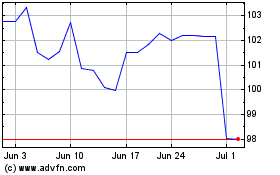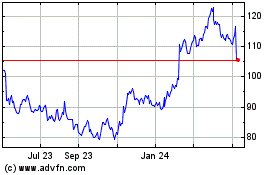Disney's 'Jungle Book' Becomes India's Highest-Grossing Hollywood Film
April 21 2016 - 12:39PM
Dow Jones News
By Preetika Rana
NEW DELHI -- Walt Disney Co. has managed to do something with
its new remake of "The Jungle Book" that many Oscar-winning movies
have failed to do: sell India to Indians.
The film, based on a collection of stories by Rudyard Kipling,
earned more than $24 million in ticket sales during its first two
weeks in Indian theaters, making it the highest-grossing Hollywood
film of all time here.
Disney's earnings in India are a small slice of the $357 million
"The Jungle Book" has grossed world-wide. The movie has made about
$125 million in its domestic market -- the U.S. and Canada -- and
$64 million in China. India is its third-biggest market.
The India collections are also not a huge haul compared with
last year's biggest domestic blockbusters, which took in more than
twice as much at the box office, but it is a sign U.S. studios are
gaining significant traction in the world's second-most-populous
country, a market that has long eluded them.
One of the secrets to Disney's success was a marketing campaign
that tapped into nostalgia among young adults for the "Jungle Book"
stories, which revolve around the adventures of an Indian boy named
Mowgli.
A cartoon series based on Kipling's tales, which was made in
Japan, was hugely popular when it aired on state television in
India in the 1990s.
Disney wanted to "awaken the Mowgli in every Indian," said
Amrita Pandey, a vice president at Disney in India. In addition to
children, the movie drew "parents, young working adults -- everyone
who wanted to come see the film. And that happened because we
revived their childhood."
The studio composed its own rendition of the animated series'
Hindi theme song, which has become a generational touchstone for
Indians now in their late 20s and 30s. Disney's music video has
racked up more than 5 million views on YouTube.
The company also expanded the film's reach by distributing it
dubbed in three local languages -- Hindi, Tamil and Telugu -- in
addition to the English version. The non-English versions accounted
for more than half of all ticket sales.
"It's really tough to get the numbers if it's just an English
film," Ms. Pandey said.
Some of Hollywood's biggest India-inspired hits have generated
more controversy than ticket sales here. Critics attacked Danny
Boyle's Oscar-winning "Slumdog Millionaire" as an overly poor
representation of their country.
Other movies with India connections, such as "The Hundred Foot
Journey" or "The Best Exotic Marigold Hotel," have received little
or no screen-time here.
"To Indians, these movies feel like an Anglicized view of
India," said Jehil Thakkar, head of the media and entertainment
division of KPMG in India. In contrast, he said, the average Indian
thinks of "Jungle Book" as more Indian than Western.
"In some ways it is ironic that India's biggest blockbuster
comes from the man who wrote 'The White Man's Burden,' the man who
wrote 'Kim,'" said Robert Thompson, a professor who studies pop
culture at Syracuse University, referring to two Kipling works
often criticized for having colonialist and racist overtones.
In "The White Man's Burden," written several years after Jungle
Book, Kipling, an Indian-born English writer who died in 1936,
talks about how he believed white men were destined to travel to
far-off foreign lands to bring local savages into the civilized
world.
For many Indians, though, Mowgli, the hero of "Jungle Book," was
a revelation.
"The cartoon stuck with us so much more than Cinderella or
Sleeping Beauty," said Indian author and "Jungle Book" buff
Meenakshi Reddy Madhavan. "That's because every kid saw Mowgli in
them. We would think, 'A brown kid. Just like me!'"
KPMG's Mr. Thakkar said Hollywood is gaining ground in India by
going more local. Last year, for example, Universal Studio Inc.
released "Furious 7" dubbed in three local languages. It made $23
million, a record until "The Jungle Book" came along.
KPMG estimates Hollywood's earnings in India will grow faster
than those of the Indian industry, known as Bollywood, in the next
five years.
Write to Preetika Rana at preetika.rana@wsj.com
(END) Dow Jones Newswires
April 21, 2016 12:24 ET (16:24 GMT)
Copyright (c) 2016 Dow Jones & Company, Inc.
Walt Disney (NYSE:DIS)
Historical Stock Chart
From Mar 2024 to Apr 2024

Walt Disney (NYSE:DIS)
Historical Stock Chart
From Apr 2023 to Apr 2024
